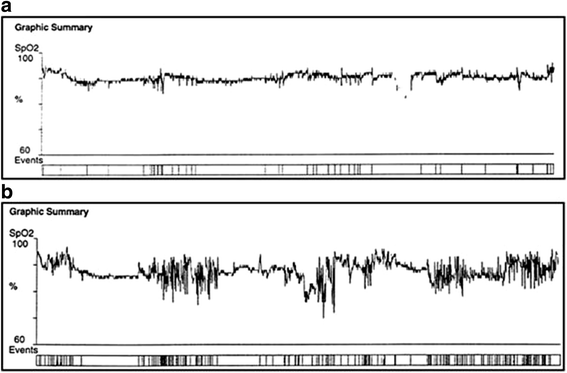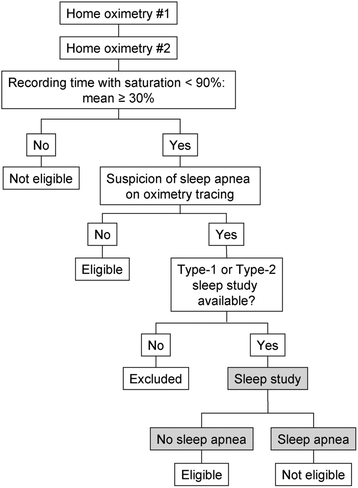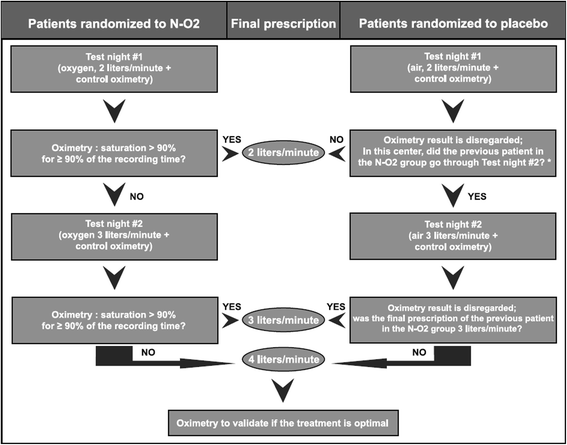Multi-center, randomized, placebo-controlled trial of nocturnal oxygen therapy in chronic obstructive pulmonary disease: a study protocol for the INOX trial
- PMID: 28069009
- PMCID: PMC5223547
- DOI: 10.1186/s12890-016-0343-9
Multi-center, randomized, placebo-controlled trial of nocturnal oxygen therapy in chronic obstructive pulmonary disease: a study protocol for the INOX trial
Abstract
Background: Long-term oxygen therapy (LTOT) is the only component of the management of chronic obstructive pulmonary disease (COPD) that improves survival in patients with severe daytime hypoxemia. LTOT is usually provided by a stationary oxygen concentrator and is recommended to be used for at least 15-18 h a day. Several studies have demonstrated a deterioration in arterial blood gas pressures and oxygen saturation during sleep in patients with COPD, even in those not qualifying for LTOT. The suggestion has been made that the natural progression of COPD to its end stages of chronic pulmonary hypertension, severe hypoxemia, right heart failure, and death is dependent upon the severity of desaturation occurring during sleep. The primary objective of the International Nocturnal Oxygen (INOX) trial is to determine, in patients with COPD not qualifying for LTOT but who present significant nocturnal arterial oxygen desaturation, whether nocturnal oxygen provided for a period of 3 years decreases mortality or delay the prescription of LTOT.
Methods: The INOX trial is a 3-year, multi-center, placebo-controlled, randomized trial of nocturnal oxygen therapy added to usual care. Eligible patients are those with a diagnosis of COPD supported by a history of past smoking and obstructive disease who fulfill our definition of significant nocturnal oxygen desaturation (i.e., ≥ 30% of the recording time with transcutaneous arterial oxygen saturation < 90% on either of two consecutive recordings). Patients allocated in the control group receive room air delivered by a concentrator modified to deliver 21% oxygen. The comparison is double blind. The primary outcome is a composite of mortality from all cause or requirement for LTOT. Secondary outcomes include quality of life and utility measures, costs from a societal perspective and compliance with oxygen therapy. The follow-up period is intended to last at least 3 years.
Discussion: The benefits of LTOT have been demonstrated whereas those of nocturnal oxygen therapy alone have not. The INOX trial will likely determine whether supplemental oxygen during sleep is effective in reducing mortality, delaying the need for LTOT and improving health-related quality of life in patients with COPD who desaturate overnight.
Trial registration: Current Controlled Trials ISRCTN50085100 ; ClinicalTrials.gov NCT01044628 (date of registration: January 6, 2010).
Keywords: COPD; Mortality; Oxygen therapy; Randomized trial; Sleep.
Figures



References
-
- Hill K, Goldstein RS, Guyatt GH, Blouin M, Tan WC, Davis LL, Heels-Ansdell DM, Erak M, Bragaglia PJ, Tamari IE, et al. Prevalence and underdiagnosis of chronic obstructive pulmonary disease among patients at risk in primary care. CMAJ. 2010;182(7):673–8. doi: 10.1503/cmaj.091784. - DOI - PMC - PubMed
-
- Statistics_Canada: The 10 leading causes of death, 2011. Statistics Canada 2011. [http://www.statcan.gc.ca/pub/82-625-x/2014001/article/11896-eng.htm]. Accessed 11 Dec 2016.
-
- Medical_Research_Council_Party Long term domiciliary oxygen therapy in chronic hypoxic cor pulmonale complicating chronic bronchitis and emphysema. Report of the Medical Research Council Working Party. Lancet. 1981;1(8222):681–6. - PubMed
-
- O'Donnell DE, Aaron S, Bourbeau J, Hernandez P, Marciniuk DD, Balter M, Ford G, Gervais A, Goldstein R, Hodder R, et al. Canadian Thoracic Society recommendations for management of chronic obstructive pulmonary disease - 2007 update. Can Respir J. 2007;14(Suppl B):5B–32. doi: 10.1155/2007/830570. - DOI - PMC - PubMed
Publication types
MeSH terms
Substances
Associated data
Grants and funding
LinkOut - more resources
Full Text Sources
Other Literature Sources
Medical
Miscellaneous

